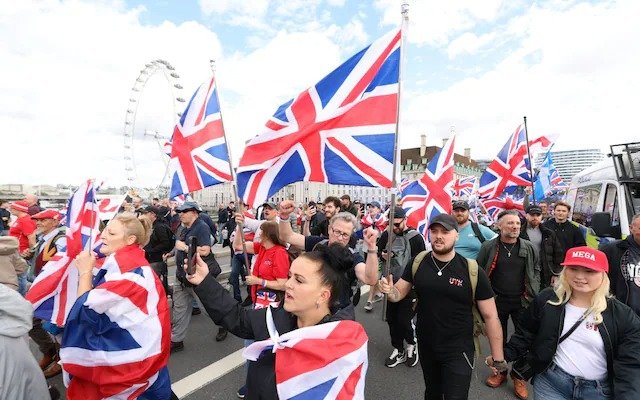Tens of thousands of protesters flooded central London on Saturday for a rally organized by anti-immigrant activist Tommy Robinson. Waving English and British flags, demonstrators packed the streets south of the River Thames before marching toward Westminster, home of the UK parliament.
The Metropolitan Police deployed more than 1,600 officers across the capital, including 500 from outside forces, in anticipation of clashes. A counter-demonstration organized by the group Stand Up to Racism gathered nearby, reflecting deep divisions in Britain’s political and cultural debate.
Robinson billed the march—called “Unite the Kingdom”—as both a free speech event and a memorial for American conservative activist Charlie Kirk, who was shot dead earlier in the week. In a post on X, Robinson declared: “Hundreds of thousands already pack the streets of central London as we Unite as one for our freedoms.”
Participants carried the Union Jack and the red-and-white St. George’s Cross, while some waved American and Israeli flags or wore red “Make America Great Again” hats associated with U.S. President Donald Trump. Placards reading “send them home” and chants against Prime Minister Keir Starmer highlighted the rally’s anti-immigrant focus. Many families brought children to the event, portraying it as a patriotic demonstration.
Supporters expressed frustration with current policies. “We want our country back, we want our free speech back on track,” said Sandra Mitchell, a rally attendee. “They need to stop illegal migration into this country. We believe in Tommy.”
Despite his influence among followers, Robinson—whose real name is Stephen Yaxley-Lennon—remains a divisive figure. He has multiple criminal convictions and is often accused of fueling anti-Muslim sentiment. While he has high-profile supporters, including billionaire Elon Musk, mainstream political movements have kept their distance. Reform UK, Britain’s largest anti-immigrant party and a rising force in opinion polls, has avoided direct association with Robinson.
Police leaders emphasized that their approach would balance the right to protest with the need to maintain public safety. Commander Clair Haynes, who oversaw the operation, said: “We will approach them as we do any other protests, policing without fear or favour, ensuring people can exercise their lawful rights but being robust in dealing with incidents or offences should they occur.” She also acknowledged that previous rallies had seen “anti-Muslim rhetoric and offensive chanting by a minority,” but stressed that Londoners should not feel compelled to stay indoors.
The scale of Saturday’s event comes during a summer of heightened tension in Britain. Last week, nearly 900 people were arrested during a London protest linked to Palestine Action after a government ban on the group. Police resources this weekend were further stretched by major football matches and music concerts.
Immigration has surged to the forefront of UK politics, eclipsing concerns about the economy. Official figures show more than 28,000 migrants have crossed the English Channel in small boats this year, a record pace that has intensified debate over asylum and border security. The visible presence of English flags painted on roads and displayed in neighborhoods underscores how the issue has spilled into public spaces.
To supporters, the flag-waving represents a spontaneous expression of national pride. But anti-racism campaigners interpret it as a coded message of hostility toward foreigners, warning that rallies like Robinson’s could normalize exclusionary rhetoric.
The demonstration also underscores the polarization of British politics under Prime Minister Starmer’s leadership. His Labour government faces mounting pressure to address immigration, while simultaneously managing public frustration over housing shortages, public services, and economic stagnation.
As London streets filled with chants, banners, and counter-demonstrations, the day illustrated how the immigration debate has become the defining fault line of modern British politics. With Robinson mobilizing mass crowds and mainstream parties struggling to navigate the issue, the tensions are unlikely to ease soon.







